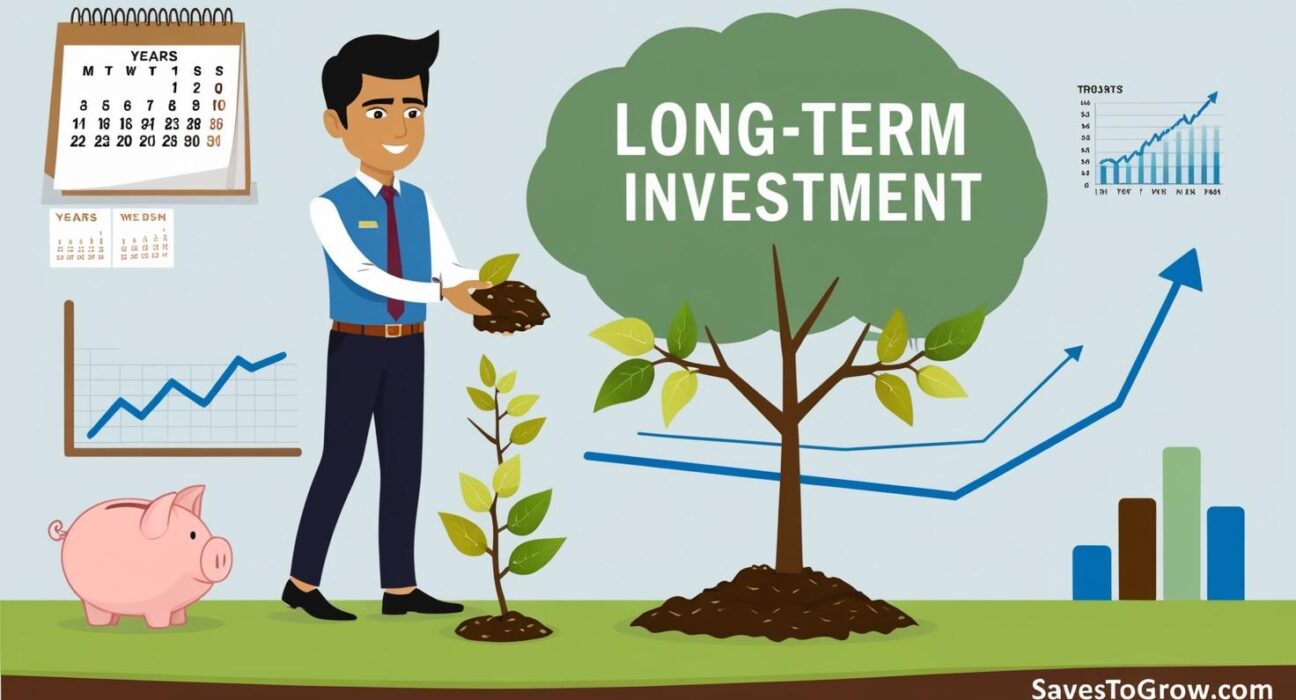Introduction: The Tortoise Wins the Race
Imagine two friends in 2010:
- Rahul buys ₹10,000 of Reliance shares and forgets about them.
- Priya trades the same stock daily, trying to time the market.
Fast-forward to 2024:
- Rahul’s ₹10,000 grew to ₹1.2 lakhs (12x).
- Priya’s portfolio? She barely broke even after fees and stress.
This is the magic of long-term investing—patiently letting your money grow like a tree, not chasing overnight gains.
What Is Long-Term Investing?
Long-term investing means buying and holding assets (stocks, mutual funds, real estate) for 5+ years, ignoring short-term market noise.
Key Features:
✔ Time Horizon: 5+ years (often 10–30 years).
✔ Goal: Wealth creation, retirement, big future expenses.
✔ Approach: “Buy and hold” quality assets.
Examples:
- Investing in index funds for retirement.
- Holding stocks like HDFC Bank, Infosys for decades.
Why Long-Term Investing Works?
1. Compound Interest Effect
- Your money earns returns, which then earn their own returns.
- Example: ₹10,000 at 12%/year = ₹1 lakh in 20 years.
2. Beats Short-Term Trading
- 90% of day traders lose money (SEBI study).
- Long-term investors benefit from economic growth.
3. Lower Stress & Costs
- No need to monitor daily price swings.
- Fewer taxes (long-term capital gains taxed lower than short-term).
Long-Term vs. Short-Term Investing
| Feature | Long-Term Investing | Short-Term Trading |
|---|---|---|
| Time Frame | 5+ years | Days to months |
| Risk | Lower (volatility smooths out) | Very high |
| Effort | Minimal (passive) | High (constant monitoring) |
| Tax | 10% LTCG (stocks) | 15% STCG |
Best Long-Term Investments in India
1. Equity Mutual Funds (SIPs)
- Invest small amounts monthly (e.g., ₹5,000 in Nifty 50 index fund).
2. Blue-Chip Stocks
- Reliance, TCS, HUL—proven companies with decades of growth.
3. PPF/EPF
- Safe, tax-free returns (7–8%).
4. Real Estate
- Land/property in growing areas (illiquid but appreciates).
How to Start Long-Term Investing?
- Define Goals (retirement, child’s education, house).
- Open Demat + Trading Account (Zerodha, Groww).
- Start SIPs (e.g., ₹5,000/month in index funds).
- Hold & Ignore Noise – Don’t panic in market crashes.
Common Mistakes to Avoid
❌ Checking Portfolio Daily – Leads to impulsive decisions.
❌ Chasing “Hot Tips” – Stick to your plan.
❌ Selling in Crashes – Markets always recover (2008, 2020).
Real-Life Success Stories
- ₹1 lakh in Infosys IPO (1993) → Worth ₹500+ crores today.
- SIP in Nifty 50 (20 years) → Avg. 12–14% annual returns.
FAQs
1. How long is considered long-term investing?
Typically, long-term investing is defined as a period of five years or more.
2. Can I lose money with long-term investing?
Yes, there are risks, but historically, markets tend to recover over time, making it safer than short-term strategies.
3. Is long-term investing suitable for beginners?
Absolutely! It’s often recommended for beginners as it allows for growth without the stress of daily market fluctuations.
4. What’s the best investment option for long-term growth?
There isn’t a one-size-fits-all answer, but a mix of stocks, bonds, and real estate can yield great results over the long haul.
5. How often should I review my long-term investments?
It’s good practice to review your portfolio at least once a year to ensure alignment with your goals.
Final Takeaways
✔ Long-term investing = Patience + Compounding.
✔ Beats trading in returns, stress, and taxes.
✔ Start early – Even ₹1,000/month grows into crores over time.






